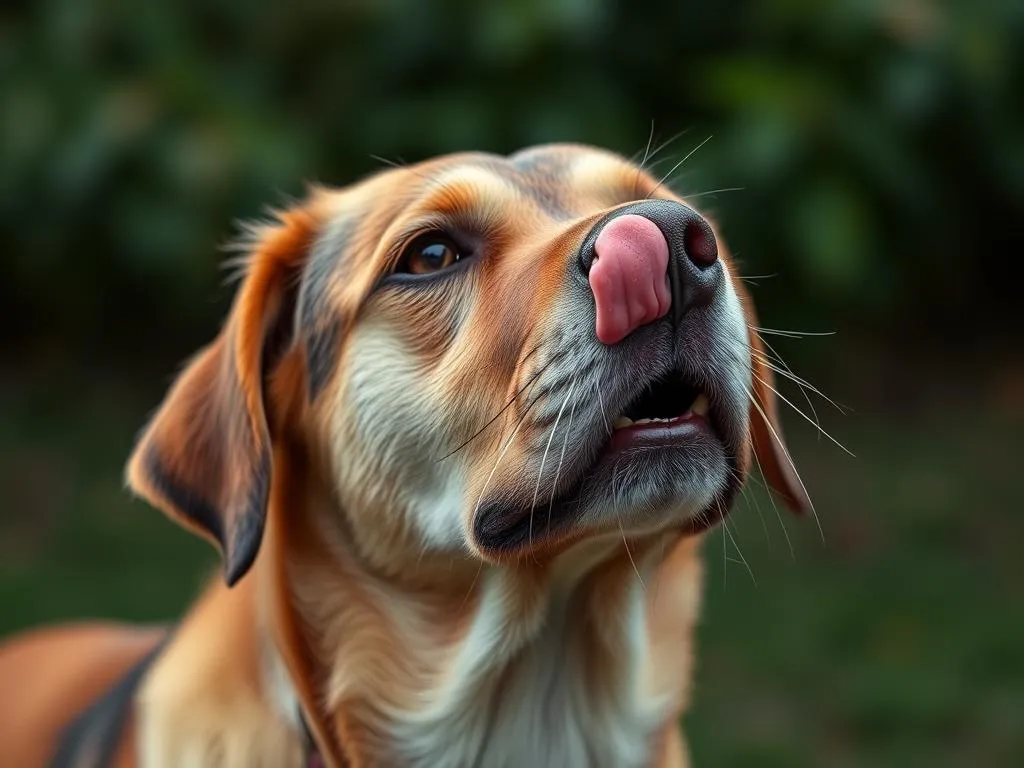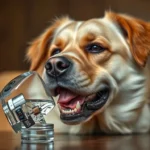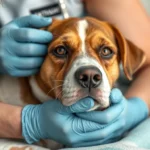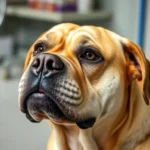
Dogs exhibit a variety of behaviors, some of which can leave pet owners puzzled. One such behavior is air licking. This peculiar habit can occur for a multitude of reasons, ranging from harmless quirks to signs of underlying health issues. Understanding why dogs lick air is essential for any dog owner, as it can indicate both physical and emotional states. This article delves into the reasons behind this behavior and offers insights from veterinary professionals to help you better understand your furry friend.
Understanding Canine Behavior
The Nature of Dog Behavior
Dogs are instinctual creatures, often driven by their natural instincts and the environment around them. Their behaviors can range from playful antics to more concerning actions like air licking. Understanding these behaviors can provide valuable insight into a dog’s mental and physical health.
Common behaviors in dogs include barking, digging, and chewing, each serving a purpose, whether it’s communication, exploration, or stress relief. Recognizing the significance of these actions is vital for effective training and care, especially when unusual behaviors like licking air arise.
Why Behavior Matters
Understanding your dog’s behavior is crucial for several reasons. First, it helps in effective training and care, ensuring that you respond appropriately to your pet’s needs. Second, certain behaviors can indicate health or emotional issues. For example, if your dog is licking air excessively, it may be a sign of discomfort or anxiety that requires immediate attention.
What Does It Mean When Dogs Lick Air?
Common Reasons for Air Licking
There are several common factors that can lead to air licking in dogs:
-
Hunger or Thirst: Dogs may lick the air when they are hungry or thirsty, often as a way to communicate their needs. If your dog is licking air around mealtime or when their water bowl is empty, it might be an indication that they are searching for food or water.
-
Nausea or Digestive Issues: If a dog is feeling nauseous or has digestive discomfort, they may resort to air licking. This behavior can sometimes be a coping mechanism for the unease they’re experiencing in their stomach.
-
Anxiety or Stress: Dogs often lick air as a way to self-soothe when they are anxious or stressed. This behavior can be a coping mechanism in response to loud noises, changes in their environment, or separation from their owners.
Less Common Causes
While the common reasons for air licking are often benign, there are less common causes worth considering:
-
Neurological Disorders: In some cases, air licking may be linked to neurological issues. Conditions such as seizures can manifest in various ways, including unusual licking behaviors. If you notice other concerning signs, consult your veterinarian.
-
Allergies or Skin Irritation: Allergic reactions or skin irritations can sometimes cause dogs to lick the air. If they are experiencing itchiness or discomfort, they might resort to licking as a way to find relief.
When to Be Concerned
Signs That Air Licking Is Problematic
While air licking can be normal behavior for some dogs, there are signs that it may be problematic. Keep an eye out for:
-
Excessive Air Licking: If your dog is licking air more frequently than usual, it may be time to consult a veterinarian. Excessive licking can indicate an underlying issue that needs addressing.
-
Accompanying Symptoms: Symptoms such as vomiting, lethargy, loss of appetite, or changes in behavior alongside air licking should not be ignored. These could indicate health problems that require veterinary attention.
Health Issues Linked to Air Licking
Air licking can sometimes be associated with various health conditions, including:
-
Gastrointestinal Problems: Conditions like gastroenteritis or pancreatitis can cause nausea and discomfort, leading to air licking. If your dog exhibits signs of digestive distress, a thorough examination is necessary.
-
Psychological Disorders: Anxiety and compulsive disorders can manifest in behaviors like air licking. Understanding the root cause of your dog’s anxiety can help in finding effective treatment options.
Veterinary Insights: The Vet’s Perspective
What Vets Look For
When you take your dog to the vet for excessive air licking, the veterinarian will conduct a comprehensive examination. This may include:
-
Physical Examination: The vet will check for any physical signs of illness or discomfort.
-
Diagnostic Tests: Depending on the findings, diagnostic tests such as blood tests, X-rays, or ultrasounds may be recommended to rule out any underlying health issues.
Treatment Options
The treatment for air licking will depend on the underlying cause identified during the veterinary examination. Possible treatments include:
-
Dietary Changes: If hunger or digestive issues are the root cause, your vet may recommend dietary adjustments to alleviate discomfort.
-
Medications: For dogs suffering from anxiety or nausea, medications may be prescribed to help manage their symptoms effectively.
-
Behavioral Training and Modification: If the licking behavior is linked to anxiety, a vet may suggest behavioral training techniques to help your dog cope with stress in healthier ways.
Preventive Measures and Care
Routine Health Check-Ups
Regular veterinary visits are crucial for maintaining your dog’s overall health. Routine check-ups can help identify potential health issues before they become serious, allowing for timely interventions.
Creating a Calm Environment
A calm and secure environment can significantly reduce anxiety in dogs. Consider the following tips:
-
Safe Space: Create a designated area in your home where your dog can retreat when feeling stressed.
-
Routine: Maintain a consistent daily routine for feeding, walks, and playtime to provide stability.
-
Mental Stimulation: Engage your dog in mental exercises and interactive toys to keep them occupied and reduce boredom-related behaviors.
Training Techniques
Training your dog to discourage unwanted licking behaviors can be beneficial. Here are some techniques to consider:
-
Positive Reinforcement: Reward your dog with treats or praise when they refrain from licking air.
-
Redirect Attention: When your dog starts to lick air, redirect their attention to a toy or a command to reinforce positive behavior.
-
Consistency: Be consistent with your training methods to help your dog understand what behaviors are expected.
Conclusion
Understanding why dogs lick air is essential for ensuring their well-being. While it can be a harmless quirk, it may also indicate underlying issues that require attention. Keep an eye on your dog’s behavior, and don’t hesitate to consult your veterinarian if you notice excessive air licking or any accompanying symptoms. By being proactive in monitoring your pet’s behavior, you can help ensure a happy and healthy life for your furry friend.
Frequently Asked Questions (FAQs)
Is air licking harmful to my dog?
Air licking itself is not inherently harmful; however, if it becomes excessive, it may indicate underlying health issues that need to be addressed.
What should I do if my dog licks air a lot?
If your dog is licking air frequently, monitor their behavior and look for accompanying symptoms such as vomiting or lethargy. If concerns arise, consult your veterinarian for guidance.
Can air licking be a sign of a serious condition?
Yes, while air licking can be a benign behavior, it can also be linked to serious conditions like gastrointestinal problems or psychological disorders. If you’re concerned, it’s best to seek veterinary advice.









